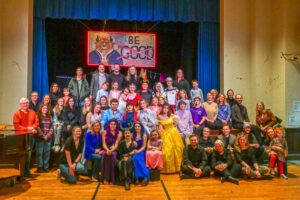Dear all,
We are coming up on what I think of as the heart of the church year. Holy Week, the week beginning with Palm Sunday and running to Easter Morning, offers us a chance to live the stories that are foundational to our faith. We shout “Hosanna!” with the crowd that greets Jesus as he enters Jerusalem (Palm Sunday); we share a meal and wash feet with Jesus and his friends (Maundy Thursday); we betray Jesus and condemn him with Peter and the crowd, we weep with Mary at the foot of the cross (Good Friday); we wait through the long hours of the night, remembering the stories of our journey with God and wondering at what is to come until the light of the resurrection breaks through (the Easter Vigil); and we gasp in astonishment with the women when we return to find the stone rolled away and the tomb empty (Easter morning). Living these stories through our liturgies, prayers, and hymns connects us through time and space to the Christians across history who have also lived these stories, in whose hearts these stories have also taken root.
This kind of living remembering isn’t just bound to Holy Week – it’s something we do every week during the Eucharist. The fancy church word for it is anamnesis. In the Eucharist, we participate in a meal that is far beyond what we see and hear at Redeemer. We join Jesus and his friends at the Last Supper every week, and every Christian who has celebrated the Eucharist in their own time and place. Holy Week is an opportunity to bring all those foundational stories into close perspective, to roll around in our remembering, even when it’s uncomfortable.
And parts of it are uncomfortable – though perhaps terrible is a better word: Just like we participate in the Last Supper, we also participate in Jesus’s crucifixion. We shout, “Crucify him! Crucify him!” with the crowd. The man we met as a baby, who has led us and taught us, whose actions as a servant we modeled by washing one another’s feet, becomes someone against whom we rail. How terrible – and how terrifying to know what we as humans are capable of. It’s a terror that I am reminded of this week as we listen to reports of yet another school shooting. We have so much capacity to hurt each other, and in the case of gun control, there is so much we could do to prevent that harm, which makes our country’s continued inaction even more awful. As a body, the Episcopal Church strongly supports efforts to end our deeply shameful and uniquely American crisis of gun violence. Here in Maryland, Bishop Sutton and Bishop Ihloff are both members of Bishops United Against Gun Violence. If you are looking for steps that you can take right now, you can call or write your Senators and Representatives using this script from the Episcopal Public Policy Network.
And yet, in the face of the terror and harm we can inflict on each other, we have so much capacity to love and serve each other, too. That is part of the mystery of Easter, part of its deep grace – that even as we have shown the worst of ourselves, Jesus calls out the best of what we contain, loves us, shows us a better way, and redeems us. What if we were to remember and relive that better way every day – serving one another instead of our own interests? What if we really did beat our swords into plowshares? It’s what we seek to do together as Christians, what our shared life in community aims to help us achieve. May our conviction and commitment to that love and grace be strengthened as we live this Holy Week together.
Love,
Rebecca+
